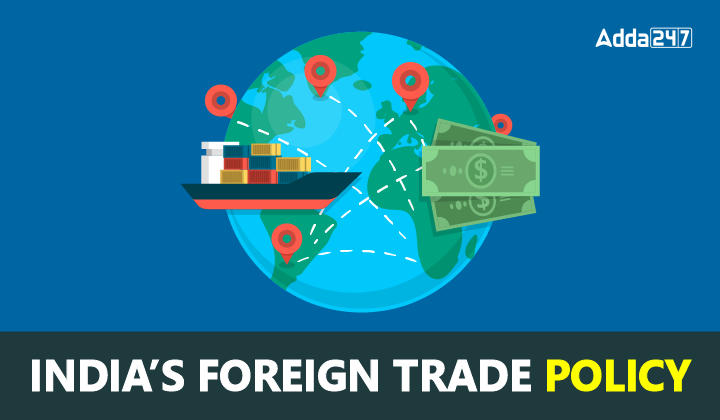Table of Contents
Trade is not an end in itself but a means to a greater end, namely, economic growth and national development. Governments issue their policies with regard to their imports and exports in the context of the ever-increasing importance of the external sector in their economies. In this article, we study what constitutes trade policy, its objectives, its strategy and the highlights of the latest foreign trade policy.
Foreign Trade Policy Overview
International trade today, more than ever before, is the driving force of economic activities. It not only enables the exchange of goods and services among countries, but in today’s world, it serves as the bedrock for the increasingly interdependent global network of technology, investment and production. No country can disregard these issues that offer challenges as well as opportunities. India’s trade policy must respond to these challenges. The Indian foreign trade policy is an important and well-chiselled blueprint that provides a direction for the exports and imports of the country.
What is Foreign Trade Policy (FTP)?
It is a policy statement of the central government that defines in clear terms the type of policy that would govern the forthcoming year’s external trade comprising imports and exports, both merchandise and services and the kind of encouragement provided by it to augment exports in terms of reduction in duties, increase in subsidies and other concessions and the ways and means of pruning unwarranted imports.
The Ministry of Commerce and Industry of the Government of India announces the foreign trade policy, also known as the Exim policy, once every five years. The policy, as we have seen, aims at developing export potential and export performance, encouraging foreign trade and creating a favourable balance of payments position.
| India’s Foreign Trade Policy Overview | |
| Ministry concerned | The Ministry of Commerce and Industry, Government of India |
| First issued | In 1992 |
| The Latest policy | Foreign Trade Policy, 2023-28 |
| Issued by | Piyush Goyal |
| Another name | EXIM Policy |
| Came into effect | 1st April 2023 |
Objectives of India’s Foreign Trade Policy
The principal objective of trade is not merely to earn foreign exchange, but to boost economic activity. India’s foreign trade policy is rooted in this belief and built around the following two major objectives.
- (i) To ensure a two-fold increase in the country’s percentage share of global products’ trade within the next five years.
- (ii) To act as an effective tool of economic growth by giving a push to employment generation.
Strategies Adopted in India’s Foreign Trade Policy
The objectives already stated are planned to be achieved by adopting, among others, the following strategies:
- Removing controls and preparing for an atmosphere of trust and openness to give free vent to the native genius and entrepreneurship of our businessmen, industrialists and traders;
- Bringing down transaction costs and simplifying procedures;
- Rendering ineffective the incidence of all levies and duties on inputs used in the export of goods, based on the basic principle that duties and levies should not be exported;
- Enabling India to develop herself as a global hub for manufacturing, trading and services;
- Identifying and fostering special focus areas which would generate additional employment opportunities, predominantly in semi-urban and rural areas, and developing a series of ‘initiatives’ for each of these;
- Bringing about technological transformation and infrastructural development of all the sectors of the Indian economy, particularly through the import of investment goods and equipment, thereby increasing value addition and productivity while achieving internationally accepted standards of quality;
- Avoiding unrealistic duty structures and seeing that our domestic sectors are not placed at a disadvantage while we enter into the free trade agreements/regional trade agreements/preferential trade agreements with a view to augmenting our exports;
- Improving our infrastructural network, both physical and virtual, connected to the entire foreign trade chain, to global standards;
- Invigorating the Board of Trade by reframing its role, offering it due recognition and bringing in experts on trade policy; and
- Revitalizing our embassies as pivotal players in our export strategy and linking our commercial wings abroad through an electronic platform for real-time trade intelligence and enquiry diffusion.
UGC NET Commerce Notes PDF & Study Materials
India’s Foreign Trade Policy 2023
India’s Foreign Trade Policy 2023 is not just a policy document; it’s a dynamic blueprint that harmoniously blends established practices with contemporary trade demands. Rooted in the core values of trust and collaboration, the policy fosters a seamless export ecosystem while remaining agile enough to adapt to the evolving trade requisites. Central to the policy’s design are four foundational pillars that collectively form its guiding principles. These pillars encompass
- Incentive to Remission: Encouraging and rewarding exporters to fuel growth.
- Export Promotion through Collaboration: Establishing partnerships between exporters, states, districts, and Indian Missions to amplify the impact of trade initiatives.
- Ease of Doing Business: Streamlining processes, reducing transaction costs, and embracing electronic initiatives.
- Emerging Areas: Embracing the potential of E-commerce, propelling the development of Districts as Export Hubs, and refining the Special Chemicals, Organisms, Materials, Equipment, and Technologies (SCOMET) policy.
Highlights of India’s Foreign Trade Policy 2023- 2028
Below are some major highlights of India’s Foreign Trade Policy 2023-2028. Read the following section to understand the major points of highlight related to India’s Foreign Trade Policy 2023- 2028.
Process Modernization and Automation
- The new policy emphasizes leveraging technology and collaboration to promote exports.
- Small and medium-sized enterprises (MSMEs) will find it easier to access export benefits due to reduced fee structures and the introduction of IT-based schemes.
- Manual processes will be replaced with an automated system for implementing duty exemption schemes, managed through Regional Offices.
Towns of Export Excellence (TEE)
- Alongside the existing 39 towns, four additional towns—Faridabad, Mirzapur, Moradabad, and Varanasi—have been designated as TEEs.
- TEEs will enjoy priority access to export promotion funds under the MAI scheme and can take advantage of Common Service Provider (CSP) benefits for export fulfilment under the EPCG Scheme.
Recognition for Exporters
- Exporter firms that achieve a recognized ‘status’ based on their export performance will play a role in capacity-building initiatives on a voluntary basis.
- Exporters with a 2-star rating or higher will be encouraged to provide trade-related training using a standardized curriculum.
- The criteria for achieving 4 and 5-star ratings have been adjusted, allowing more firms to qualify and enhance their branding opportunities in international markets.
Promoting Exports at the District Level
- The FTP 2023 emphasizes partnering with State governments to promote exports at the district level through the Districts as Export Hubs (DEH) initiative.
- State Export Promotion Committees and District Export Promotion Committees will work to identify export-worthy products/services and address concerns at the district level.
- Each district will have a specific export action plan tailored to its unique circumstances to promote identified products and services.
Strengthening SCOMET Policy
- India is focusing more on its “export control” strategy and aligning it with export control regime countries to bolster integration.
- Increased awareness and understanding of SCOMET (Special Chemicals, Organisms, Materials, Equipment, and Technologies) among stakeholders.
- The export control system will be fortified to adhere to international treaties and agreements, providing Indian exporters access to high-end goods and technologies while ensuring compliant SCOMET exports.
Boosting E-Commerce Exports
- The policy outlines plans to establish e-commerce hubs with streamlined processes.
- As an initial step, the cap for e-commerce exports via couriers has been raised from ₹5 lakh to ₹10 lahks.
- Further adjustments to the cap will be made based on feedback from exporters.
Enhancements in the EPCG Scheme
- The EPCG Scheme, facilitating duty-free import of capital goods for export production, is being improved.
- The PM MITRA scheme has been included in the EPCG’s CSP Scheme, offering additional benefits.
- Exemption from Average Export Obligation for the dairy sector and reduced Export Obligation for Green Technology products.
Advancements in the Advance Authorization Scheme
- The Advance Authorization Scheme for DTA units, providing duty-free import of raw materials for manufacturing export items, is now on par with EOU and SEZ Schemes.
- The Apparel and Clothing sector is now covered under the Special Advance Authorization Scheme based on self-declaration, and expediting export orders.
- Benefits of the Self-Ratification Scheme for Input-Output Norms fixation extended to 2-star and higher status holders, along with Authorized Economic Operators.
Amnesty Scheme
- An online portal will be introduced under the amnesty scheme, allowing a six-month window for exporters to participate.
- The scheme addresses pending cases of default in export obligations, offering regularization upon payment of customs duties in proportion to unfulfilled obligations.
Conclusion
In conclusion, the Foreign Trade Policy (FTP) is not just a regulatory framework; it’s a compass guiding a nation’s economic interactions on the global stage. With its strategic objectives and nuanced approaches, the FTP acts as a catalyst for economic growth, fostering international partnerships, streamlining processes, and leveraging emerging trends like e-commerce and technology.
The Towns of Export Excellence (TEE) are the towns that enjoy priority access to export promotion funds under the MAI scheme and can take advantage of Common Service Provider (CSP) benefits for export fulfilment under the EPCG Scheme. Alongside the existing 39 towns, four additional towns—Faridabad, Mirzapur, Moradabad, and Varanasi—have been designated as TEEs.
Download UGC NET Commerce Study Notes PDF
The direct Link to Download UGC NET Commerce Study Notes PDF has been mentioned below. Candidate can download Foreign Trade Policy Study Notes PDF which has been mentioned below.
Download Foreign Trade Policy Objective and Strategies Study Notes PDF




 UGC NET Commerce Syllabus 2025 PDF Downl...
UGC NET Commerce Syllabus 2025 PDF Downl...
 UGC NET Philosophy Syllabus 2025 PDF Dow...
UGC NET Philosophy Syllabus 2025 PDF Dow...
 PMMMNMTT for NEP 2020, Check details Her...
PMMMNMTT for NEP 2020, Check details Her...














